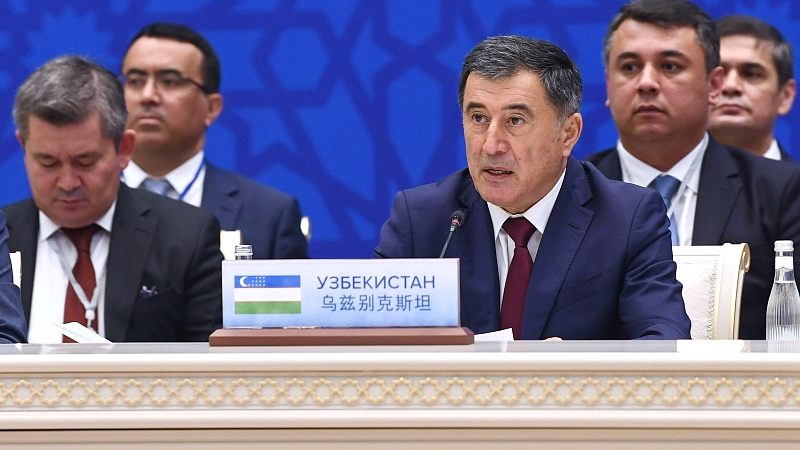
Uzbek Acting Foreign Minister Vladimir Norov attends a meeting of the Shanghai Cooperation Organization (SCO) Council of Foreign Ministers in Tashkent, Uzbekistan, July 29, 2022. /CFP
Uzbek Acting Foreign Minister Vladimir Norov attends a meeting of the Shanghai Cooperation Organization (SCO) Council of Foreign Ministers in Tashkent, Uzbekistan, July 29, 2022. /CFP
Editor's note: Anthony Moretti is an associate professor in the Department of Communication and Organizational Leadership at Robert Morris University. The article reflects the author's opinions and not necessarily those of CGTN.
The annual Shanghai Cooperation Organization (SCO) meetings, which are to be held on September 15-16 in Uzbekistan, provide an important reminder of the often diverging interests between its members and the West.
According to the Russian news agency Tass, the focus for this year's meetings will be to "raise the potential and authority of the organization, ensure peace and stability in the region, reduce poverty and ensure food security."
As I read those words, I keep coming back to one country: Afghanistan.
By now, we are well aware of what two decades of U.S. war and occupation of that country caused – misery. Brown University's Watson Institute for International and Public Affairs has concluded that the U.S. spent more than $2 trillion over two decades in reckless military adventures in Afghanistan that were part of the never clearly defined "war on terror" launched by former President George Bush following the tragic events that took place in the U.S. on September 11, 2001.
The Watson Institute also reminds us that at least "243,000 people have died as a direct result of this war. These figures do not include deaths caused by disease, loss of access to food, water, infrastructure, and/or other indirect consequences of the war."
The misery is now exacerbated because the U.S. government refuses to release billions of dollars in funds owned by Afghanistan and held by American banks. The official rhetoric is that the money will not help the Afghan people but will instead end up in the hands of terrorists.
Let's not mince words here: It serves the West's interests to fuel the potential for a humanitarian disaster in Afghanistan in order to then create a narrative suggesting "the Taliban are not legitimate stewards of the country." And with fall soon to arrive and winter to follow, there are real fears that exact kind of crisis will happen.
The United Nations High Commissioner for Refugees (UNHCR) reports that "three quarters of people's incomes is now spent on food. Six million people are teetering on the brink of famine and one million children face severe malnourishment. While a widespread hunger crisis was averted last winter, food prices continue to rise – partly due to the conflict in Ukraine – as household incomes continue to shrink."
But at least for now, the White House appears not to care.

Afghan people are waiting to enter a bank, Kabul, Afghanistan, February 13, 2022. /CFP
Afghan people are waiting to enter a bank, Kabul, Afghanistan, February 13, 2022. /CFP
The SCO has a different idea when it comes to Afghanistan. Zhang Ming, the Secretary-General of the SCO said, "In the past year, many SCO member states have provided various kinds of support and assistance to the Afghan people by helping them survive the winter, solve food security problems, and help reconstruction efforts. There are also some countries that have begun to promote cooperation in fields such as interconnected transportation and others with Afghanistan. I think these efforts will be beneficial to the goal of making Afghanistan a constructive factor in the region."
The difference in message and tone cannot be more obvious: The West wishes to undermine the Taliban, at the expense of the Afghan people, while the SCO seeks to place the Afghan people at the center of what it does.
We can agree that many of the Taliban's goals are inconsistent with Western norms. The Taliban's attitude about women and their place in society is just one example. But can we not also agree that the Afghan people are in desperate need of aid from all corners of the world and that they have rejected previous leaders basically imposed on them by the West? They are tired of war and in fear of starving.
Formed in 2001, the SCO's founding members include China, Kazakhstan, Kyrgyzstan, Russia, Tajikistan and Uzbekistan. India and Pakistan joined five years ago. Roughly one-dozen other nations are identified as either observer states or dialogue partners. The SCO enjoys cooperation with the United Nations and several regional organizations around the globe.
I mention this to affirm that the SCO is a legitimate international organization; it cannot be dismissed as some second-tier effort to counter the West. More importantly, at the moment the SCO is showing a commitment to helping the Afghan people.
The aforementioned SCO meetings this week will probably not generate headlines in the U.S. and the West. Rather, the recent hints that the tide in the Russia-Ukraine conflict might be turning in Ukraine's favor will be touted as a moment of triumph, and the West's determination to give billions upon billions of dollars in military support to Ukraine will be seen as a kind of saving grace.
But no matter when and how that conflict ends, Ukraine faces years of economic and humanitarian uncertainty. Will the West come to the aid of the Ukrainian people?
The people of Afghanistan will be closely watching.
(If you want to contribute and have specific expertise, please contact us at opinions@cgtn.com. Follow @thouse_opinions on Twitter to discover the latest commentaries in the CGTN Opinion Section.)

